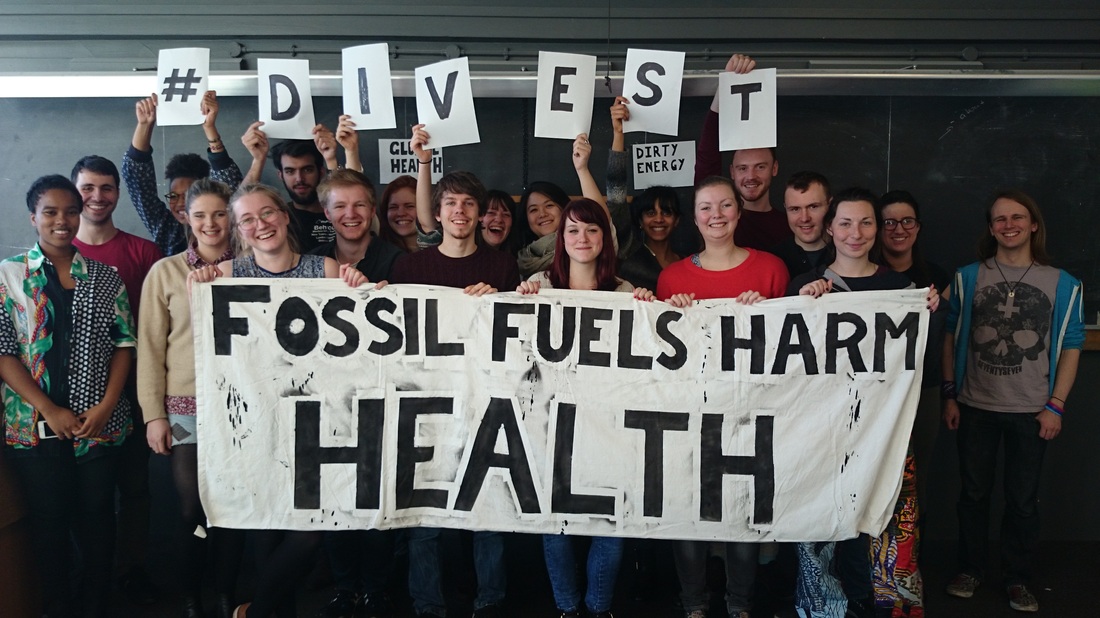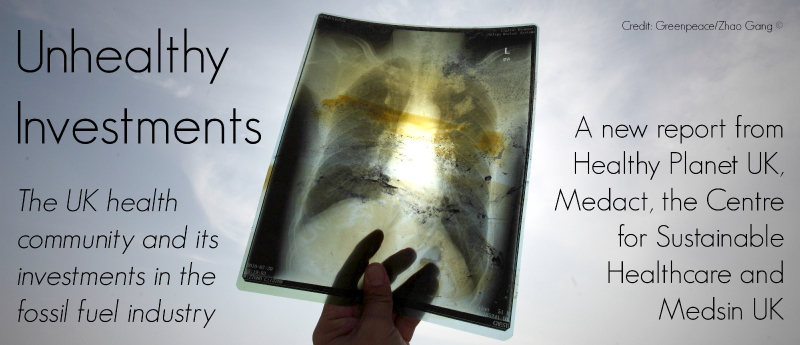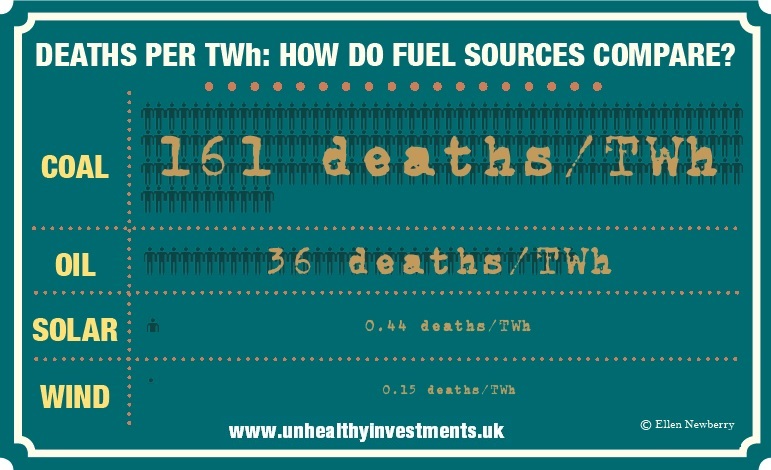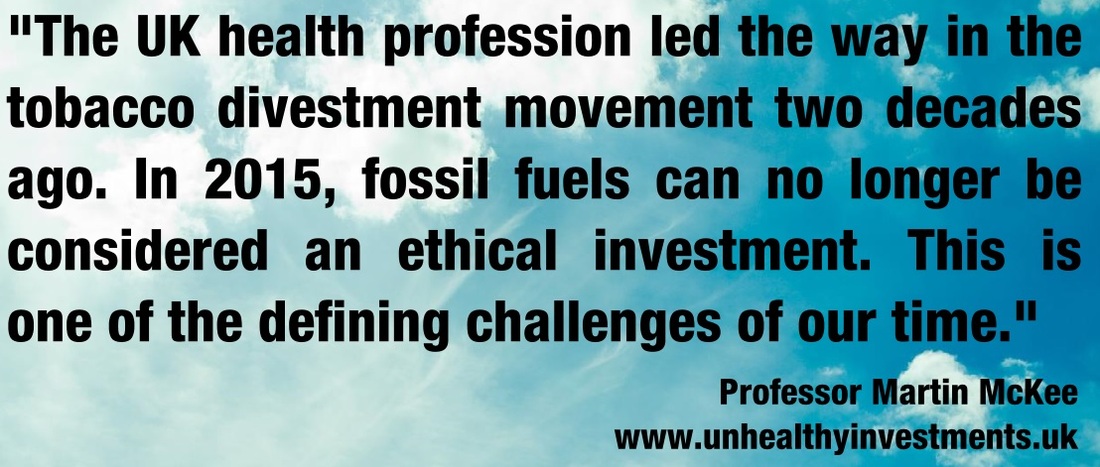To mark Global Divestment Day, we're asking as many people as possible to share their divestment stories - who they want to divest (or have already got to divest), and why. Maybe you're a nurse who wants your College to move its money; maybe a doctor and you've already switched your own bank to one standing for a fossil-free future. Maybe you're involved in one of the hundreds of university, faith group, local authority or other divestment campaigns already taking place worldwide. What have your successes been? What challenges do you face? And what does it mean for health? One way of making your case clear is demonstrated by the great start to Go Green Week made by the medsin national committee an branches from Leeds, Liverpool, Newcastle, and Sheffield. We joined forces to make the health case for divestment, which you can see in this video. If you enjoyed it, please share widely!
Whatever you do, have a great Global Divestment Day!
0 Comments
Last Tuesday evening, we launched our Unhealthy Investments report on fossil fuels, human health, and divestment (as you'll no doubt by now be sick of hearing). It didn't take long to see an impact - by Wednesday, it was already being cited in Parliament! A new Early Day Motion, tabled by Green MP Caroline Lucas, calls on the Trustees of the MPs' pension scheme to divest from the fossil fuel industry, citing the potential devastation to human and planetary health that would be caused by continued unrestrained dependence on fossil fuels.
Don't know what to say? Start with our template letter - though remember, MPs are always more likely to respond if you make it a bit more personal.
For more ideas on how to take part in Go Green Week and Global Divestment Day, take a look at our inspiration pack for medsin branches - or, as ever, get in touch! Yesterday evening marked the launch of Unhealthy Investments, the report on climate change, global health and the fossil fuel industry. Medact and Healthy Planet produced this report, published alongside the Centre for Sustainable Healthcare, the Climate and Health Council, and medsin, as a tool to help health workers make the case for their representative bodies, funders, and other health sector institutions to divest from the fossil fuel industry. The report argues that:
There has been significant coverage of the report’s launch in various venues.
What now? This is only the beginning; the report and related resources, and the coverage and debate surrounding it, provide the perfect tools for healthcare students and health workers to take the case for divestment – and action on the health impacts of climate change – to their universities, trusts, unions, professional organisations, representative bodies, and other representatives of the health community. How can we go about doing this? Some ideas:
For more on divestment and health, visit the Unhealthy Investments report site: www.unhealthyinvestments.uk.
I have been involved with the fossil fuel divestment movement over the past year, both with the University and through Healthy Planet UK, after coming to terms with the enormity of climate change and the need for urgent action. As a medical student I am compelled by a similar duty of care towards our ecosystem, on which our health depends, and am called to respond to its current symptoms of distress. Divestment offers a way to treat one of the root causes of these symptoms – the continued burning of fossil fuels – through moving investments away from the fossil fuel industry whose business model relies upon burning reserves which hold over five times that which is safe to burn if we are to stay below the 2 degrees Celsius limit of global warming[1] Akin to the health sector leading divestment from the tobacco industry, there is a similar narrative in the response to the health threat of climate change further weighted by tactics utilised by the fossil fuel industry to thwart climate mitigation policy and mar public perception of the reality of climate science[2]. UK universities hold around £5.2 billion worth of investments through their endowment funds in the fossil fuel industry[3]. However, divestment is not simply a matter of money, most divestment decisions have been driven by a moral case. It rests on a simple principle -if it is wrong to wreck the planet, then it is wrong to profit from that wreckage. For the medical tradition, investing in fossil fuels can be seen to contradict the fundamental principle to “first do no harm”. So far 21 universities, 35 cities, 65 religious organisations and numerous other organisations from around the world including the British Medical Association have committed to divesting from fossil fuels[4].
Medical institutions and the health community have a unique awareness of climate change through its current and future impacts on human health, but also through the potential immense health co-benefits of tackling climate change such as reducing the disease burden of air pollution, which has recently been attributed to 2000 premature deaths annually in Scotland[5], and encouraging active travel through reducing our reliance on fossil fuel guzzling cars. This gives an important dimension to the divestment dialogue and the engagement of medical schools and health organisations is sure to be very valuable. On the 3rd February, Healthy Planet are publishing their report “Unhealthy Investments”, co-authored with MedAct, The Climate and Health Council, Medsin and the Centre for Sustainable Healthcare. This will be a crucial step towards further engagement on fossil fuel divestment from the health sector. It will involve a panel of expert speakers to discuss the question of whether organisations which work to improve health should continue to invest in fossil fuel extraction and production companies. Should the health sector be taking more of a lead in this issue? There is certainly great potential in engaging with the process and evaluating how best our pension and endowment funds can be invested towards a healthier and more sustainable future. Eleanor Dow – new Deputy coordinator of Healthy Planet UK, medical student at the University of Edinburgh References [1] http://www.carbontracker.org/ [2] http://www.greenpeace.org/usa/en/campaigns/global-warming-and-energy/polluterwatch/Dealing-in-Doubt—the-Climate-Denial-Machine-vs-Climate-Science/ [3] http://peopleandplanet.org/fossil-free [4] http://gofossilfree.org/commitments/ [5] http://www.foe-scotland.org.uk/air-pollution |
Details
Archives
February 2019
Tags
All
|





 RSS Feed
RSS Feed
